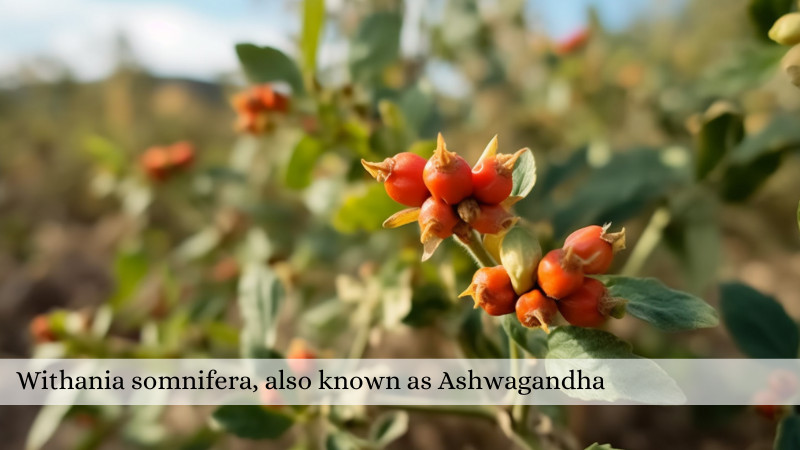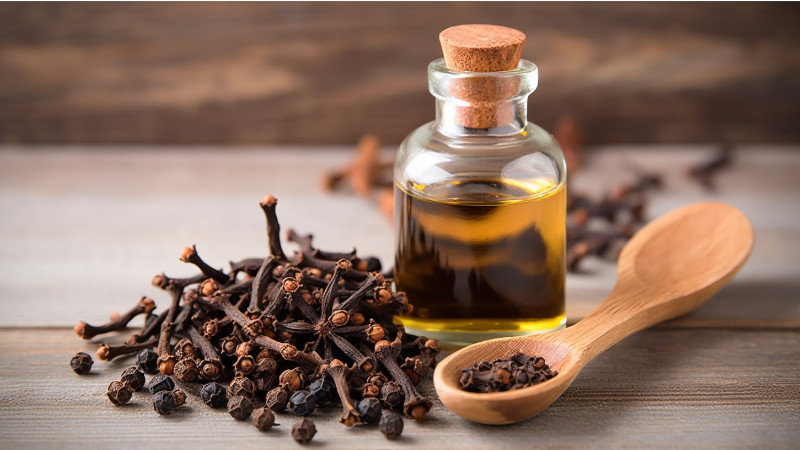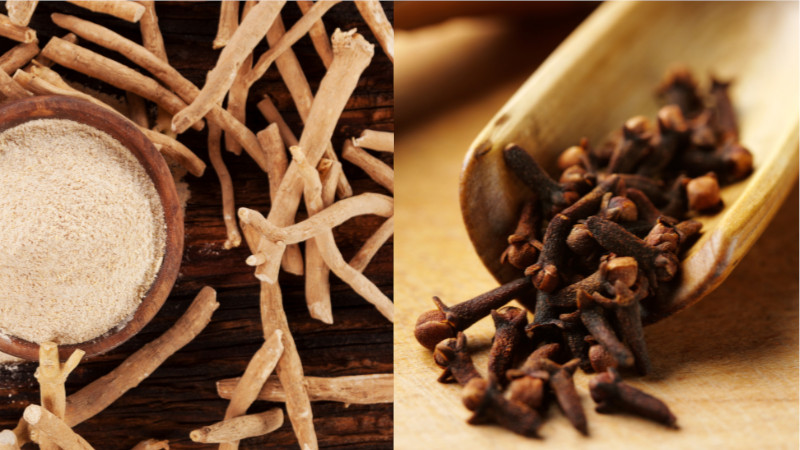Are you ready for a deep dive into ashwagandha oil vs clove oil? Alright! Let’s get it! We’re looking at two potent herbs that have been used for ages in traditional medicine; ashwagandha root and cloves. Their histories are unquestionable.
In more recent times, both herbs have been investigated for their potential to improve gut health, and even in cleansing parasites from the body.
Although they have different benefits and functions, they both have been used in natural medicine to enhance general health and wellness.
Table of Contents
Ashwagandha Oil vs Clove Oil
Withania somnifera, more commonly known as Ashwagandha, is an adaptogenic plant that is indigenous to India.
For thousands of years, it has been used to treat a range of illnesses, such as stress, anxiety, and inflammation. It has even found a place in the world of anthelmintics, more commonly referred to as a form of parasite treatment. 1
Ashwagandha root has been known to support the strengthening of gut health and immunity, and has also been relied upon to help reduce inflammation.
On the other hand, Cloves, specifically, Syzygium aromaticum, are a spice that is often used in Indian and Indo-Pacific cuisine. Cloves are an aromatic spice that comes from the dried blossoms of this amazing tree.
Originating from the North Moluccas Islands in Indonesia, not only are cloves able to impart delightful flavours and aromas to foods, but they also possess potent therapeutic qualities that have been employed for many years in traditional medical practice.
Did you know that in the 11th century spices, including cloves, were highly sought after and considered as valuable as gold?

Cloves gained popularity in Europe and Asia during the late Middle Ages, becoming a crucial ingredient in various dishes. Even today, cloves are cherished for adding a unique flavour to many recipes. 2 3
Gut Health and Parasite Cleanse
Maintaining a healthy digestive system can help prevent parasites and other unwanted germs and bacteria from taking up residence in your body.
This is largely attributed to getting your transit times to an optimal state. The longer it takes for you to digest and pass food through your system, the longer things can stay there, and when those things include eggs from certain parasites, the more likely they are to get a hold.
Parasites can cause various problems, including abdominal pain, diarrhea, and fatigue. That’s not to say that these symptoms are exclusive to these little unwanted critters, but they may be enough of a sign to get checked out.
While there are many natural remedies available for parasite cleansing, two of the most popular are Ashwagandha root and Cloves.
Apart from its anthelmintic qualities, ashwagandha has additional advantages such as being an adaptogenic herb. For thousands of years, Ayurvedic medicine has employed it.
Cloves have been found to owe their anthelmintic properties to the eugenol content. Eugenol is a substance found in clove oil that comprises 83–95 % of the oil and has been demonstrated to have antiparasitic properties.
When ingested, these compounds can target and kill various parasites in the digestive tract. Additionally, cloves can help eliminate parasite eggs, preventing further infestation. You’ve gotta get the eggs out too! 4
Ashwagandha Root for Gut Health and Parasite Cleanse
Given there is a well-established connection between the gut and the brain, this is quite important to consider the broader scope of this connection. When it comes to gut health, the results of one study suggest that ashwagandha might work by positively influencing the good bacteria in the stomach. 5

When it comes to parasite cleansing, ashwagandha root has been traditionally used to support the body’s natural detoxification processes.
What’s more, is that Ashwagandha has an anthelmintic effect which means it helps kill parasites and worms living inside our bodies. This herb can help treat anemia and iron deficiency due to worms when used frequently.
In animal trials, it was demonstrated that Ashwagandha has anti-parasitic effectiveness against Leishmania and malaria. 6
Clove for Gut Health and Parasite Cleanse
Cloves are a powerful medicinal herb with a history of being used for centuries for their antifungal, antibacterial, and antiparasitic properties. They are especially effective in treating gut-related issues, including parasites and fungal infections.
Since Cloves contains Eugenol, it can help in eliminating intestinal adult parasites, larvae, tissue-migrating newborns, and encysted larvae, offering a potential alternative to traditional anthelmintic drugs that might not always be effective in treating infections like Trichinosis. 7

They are also effective in treating digestive issues such as bloating, gas, and indigestion by producing digestive enzymes, making them a great choice for gut health. 8
They also contain antioxidants which help to protect the body against free radicals, which can cause damage to cells and contribute to chronic diseases. 9
Cloves can be consumed in various ways, including as a tea, added to food, or taken in supplement form. They are generally safe for long-term use and are a great natural alternative to conventional treatments for gut-related issues and parasite cleansing.
Want to give making your own Chai a go? Our recipe contains cloves! We use it in our Irish Sea Moss Tea.
5 Important Clove Essential Oil Dangers To Remember
Now that we know that Cloves can benefit our body and ease the painful feeling we experience we’re on track to empowering ourselves.
However, there are certain effects that we need to take note of when consuming it. Here are some of the reminders to keep in mind when considering Cloves in their various forms and uses, including Clove Essential Oil:
- Smoke from clove cigarettes can be dangerous and when inhaled, can have negative effects like breathing issues and lung disease. 10
- Eugenol, a substance found in clove oil, has been shown to slow blood clotting. Those who have bleeding disorders, or who take blood thinning medication and use clove oil run the risk of excessive bleeding. 11
- Clove supplements may decrease blood sugar levels, which may be harmful for those using diabetes treatments. When used with diabetic medications, high-dose clove supplements may lead to very low blood sugar levels. 12
- When children consume small amounts of clove oil, there have been reports of severe side effects such as convulsions, liver damage, and fluid imbalances. 13
- Some individuals rub ground cloves right onto their gums. However, the taste is described by some as bad, while others find it quite pleasant. In fact, in the not-so-recent past, it was quite common in countries like England to suck on clove and keep it against the gum when experiencing toothache. When it comes to clode oil, if you have any cuts in your mouth, you may feel a burning sensation so the oil should never be applied to the gums undiluted. 14
Clove Bud Essential Oil vs Clove Oil: The Differences
You might be confused about the differences between Clove Bud Oil and Clove Oil. Let’s take a closer look.

Clove oil, also known as the oil of clove, is an essential oil extracted from the plant specifically from its leaves, stems, and buds.
Clove bud oil, on the other hand, is specifically derived from the aromatic flower buds of the clove trees and has a stronger and more pronounced floral fragrance compared to the other types.
In the market, the term “clove oil” typically refers to clove bud oil, but it’s essential to verify the source of extraction when purchasing. The primary difference between clove oil and clove bud oil lies in their source and has the most pronounced impact on the difference in scent.
10 Steps To Make Homemade Clove Oil
Making your clove oil can be quite easy, yet not as cost-effective as just getting a bottle when you need it. When taking the DIY route, the quality and consistency from one batch to the next are likely to vary. For that reason too, you may prefer to source your clove oil from reputable suppliers.
Should you still prefer to make your own at home, we’ve outlined some simple steps for this.
With these simple steps, you can now make an easy and effective clove essential oils.
FAQs
What does not mix with Clove Oil?
Because clove oil is strong, it should be used carefully. It’s essential not to mix clove oil with other strong essential oils like oregano or cinnamon, as this can lead to skin irritations or burns. Additionally, avoid combining clove oil with medications that slow blood clotting, as clove oil can increase the risk of bleeding.
Can Ashwagandha root and Cloves be used together?
Yes, Ashwagandha root and Cloves can be used together. Both have been traditionally used in Ayurvedic medicine and offer complementary benefits. However, it’s always recommended to consult with a healthcare professional before combining any herbs or supplements, especially if you’re on medication or have underlying health conditions.
What is a substitute for Clove Oil?
If you’re looking for a substitute for clove oil, cinnamon oil or nutmeg oil can be considered. Both have warming and aromatic properties similar to clove oil. But, the therapeutic benefits might vary, so it’s essential to determine the purpose of the substitution.
Be cautious with nutmeg oil though as in high concentrations it can have unpleasant and even negative effects.
What is Clove Essential Oil best for?
Clove essential oil is best known for its antiseptic, analgesic, and anti-inflammatory properties. It’s commonly used for dental care, to relieve toothaches, and to combat bad breath.
Additionally, its warming nature makes it beneficial for reducing pain and inflammation, especially when diluted and applied topically.
Is Ashwagandha Root or Cloves better for gut health and parasite cleanse?
Both Ashwagandha root and Cloves offer benefits for gut health and parasite cleanse. While Ashwagandha supports gut health by managing stress and positively influencing gut bacteria,
Cloves, with their eugenol content, act as a potent parasite cleanser. The choice between the two would depend on the specific needs and conditions of the individual.
Are there any side effects of using Ashwagandha roots or Cloves?
Like all herbs and supplements, Ashwagandha root and Cloves can have side effects. Some people might experience diarrhea, upset stomach, or skin rashes with Ashwagandha. Cloves, when consumed in large amounts, can cause mouth irritation, and their oil can be intense if applied directly to the skin.
Can Ashwagandha root or Cloves be used for other health conditions?
Yes. Beyond gut health and parasite cleansing, Ashwagandha root is known for its adaptogenic properties, helping the body manage stress, and has been used for anxiety, arthritis, and insomnia. Cloves, on the other hand, have been used for respiratory conditions, boosting immunity, and even as a natural insect repellent.
Is Ashwagandha legal in Australia?
Ashwagandha is considered a complementary medicine in Australia and is regulated by the Therapeutic Goods Administration (TGA). It is legal to purchase and use Ashwagandha in Australia, but there may be specific regulations regarding its sale, importation, and labelling. It’s always a good idea to check the latest regulations on the TGA website or consult with a local authority to ensure compliance.
Conclusion
In the world of natural remedies, the debate between ashwagandha oil vs clove oil is gaining traction. Both Ashwagandha roots and Cloves have been celebrated for centuries for their profound benefits on gut health and their ability to cleanse the body of parasites.
Ashwagandha, with its adaptogenic properties, not only manages stress but also fortifies the gut, while the eugenol-rich Clove oil acts as a potent parasite cleanser.
As we navigate the myriad of health benefits these two powerhouses offer, it’s clear that both have a significant role in promoting our overall well-being.
We invite you to join our vibrant conversation on ashwagandha oil vs clove oil over on our Instagram and Pinterest pages. Dive in, share your experiences, and let’s explore the wonders of natural healing together!
References
- “An Overview on Ashwagandha: A Rasayana (Rejuvenator) of Ayurveda” – N. Singh, M. Bhalla, P. de Jager, M. Gilca, 3 July 2011 [PubMed Central] [Archive] ↩︎
- “Cloves” – MSI Staff, Last checked 25 October 2023 [The McCormick Science Institute] [Archive] ↩︎
- “Health Benefits of Cloves” – WebMD Editorial Contributors, Last checked 25 October 2023 [WebMD] [Archive] ↩︎
- “Eugenol (Clove Oil)” – NIH Staff, Last checked 25 October 2023 [National Library of Medicine] [Archive] ↩︎
- “Triethylene glycol-like effects of Ashwagandha (Withania somnifera (L.) Dunal) root extract devoid of withanolides in stressed mice” – A. Dey, S. Chatterjee, V. Kumar, Last checked 25 October 2023 [PubMed Central] [Archive] ↩︎
- “Anti-malarial activity of withania somnifera L. Dunal extracts in mice” – D. Dikasso, E. Makonnen, A. Debella, D. Abebe, K. Urga, W. Makonnen, D. Melaku, M. Kassa, M. Guta, Last checekd 25 October 2023 [PubMed] [Archive] ↩︎
- “Eugenol; Effective Anthelmintic Compound against Foodborne Parasite Trichinella spiralis Muscle Larvae and Adult” – M. EilGhannam, Y. Dar, M. ElMehlawy, F. Mokhtar, L. Bakr, 12 January 2023 [PubMed] [Archive] ↩︎
- “10 Ways to Get Rid of Gas Pains and Bloating” – C. Whelan, A. Sharon, 10 May 2023 [Healthline] [Archive] ↩︎
- “Clove: Health Benefits” – S. Booth, 31 October 2023 [WebMD] [Archive] ↩︎
- “Clove cigarettes. The basis for concern regarding health effects.” – T. Guidotti, L. Laing, U. Prakash, Last checked 31 October 2023 [PubMed Central] [Archive] ↩︎
- “Clove” – Medline Plus Staff, Last checked 31 October 2023 [Medline Plus] [Archive] ↩︎
- “What Are Clove Supplements?” – J. Kubala, 18 August 2023 [Health] [Archive] ↩︎
- “Haddad and Winchester’s Clinical Management of Poisoning and Drug Overdose (Fourth Edition): Essential Oils” – J. Maypole, A. Woolf, 27 April 2012 [Science Direct] [Archive] ↩︎
- “Can Clove Oil Help With a Toothache?” – S. Watson, 7 July 2023 [Verywell Health] [Archive] ↩︎
Last Updated on 5 months by D&C Editorial Team


